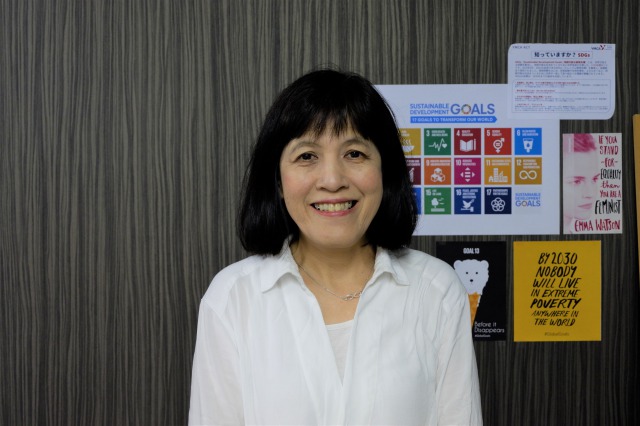News
お知らせ
YMCA ACT
Kimiko's interview
How did you become an English teacher?
I wasn’t good at any subject in elementary school, so when I became a junior high student, I decided to study English hard because it was a new start for everybody. Then, I got better marks than other subjects, which gave me confidence. English kept being my favorite subject in high school and university.
I experienced homestay abroad for a month when I was in university, but I had a hard time communicating with my host family.
I wanted to study abroad and live in a foreign country, but my mother was always strongly against the idea. It was probably because she didn’t have a good image of the States or other foreign countries due to her war experience.
I thought I need a specific skill to become economically independent, and became a junior high school teacher, which I continued for ten years.
How did you start teaching at the YMCA?
While I was teaching in junior high school, I was taking an English conversation class at the YMCA in Makigahara. My original plan was to quit the junior high and study in a graduate school in the States. But since I was also thinking of getting married at that time, I gave up studying abroad and decided to start teaching English at the YMCA.
Did you want to go abroad to study language?
Yes, but the major reason was that I wanted to experience living in a place I don’t know, struggling by myself.
Though I once gave up studying abroad, I repeatedly went to study in Pacific Lutheran University in Washington State during my summer breaks and acquired a master’s degree. I learned “Classroom Teaching” there. I also took Reading, Drama and Literature classes.
Is there anything you keep in mind when you teach?
For elementary children, I try to make sure they enjoy and always feel they like English.
For youth students, I teach what they need to learn at school. And at the same time, I want them to get used to listening, expressing themselves in English, and making presentations, which are skills that are not focused at school.
For adult students, I think it is important to understand the goal of each student.
I want to be a teacher who can bring out each student's ability and motivation.
What is the difference between large class education in junior high schools and the small group lessons at the YMCA?
When I was teaching a big class in junior high school, there must have been some children in the class who actually didn’t understand English and didn't like English.
At the YMCA, the teacher notices when the student is having difficulty, which leads to further understanding. I could teach a student for only three years in junior high school, but at the YMCA, I feel happy that I can watch a student grow for four, five, six years… as long as he/she continues to study here.
You teach Step Phonics to students with dyslexia. How did you start teaching phonics?
The former director, introduced the seminar to me. It was a very active seminar, even hard to make a reservation. I felt it is attracting attention in the teaching industry.
For phonics private lessons, I pay attention to the student’s reaction and try to cover what he/she enjoys.
How do you want your students to become?
I want them to become global citizens, who can think about themselves and the world and who are willing to solve problems happening in the world through what they have studied in English lessons.
Kimiko先生担当クラス
<小学生>
・Advanced-W (水) 17:00-18:30
<中高生>
・Starter-W (水) 18:30-19:55
<プライベートレッスン>
・ステップフォニックス

